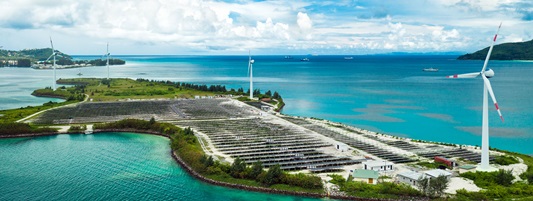Contact us
Send a messageManaging power systems with variable renewables
Power systems are the most complex man-made systems on earth and are constantly evolving, more so with the addition of variable renewable energy (VRE) sources such as solar PV and wind. Power system operators strive to keep the system functioning securely and reliably, and the inclusion of VRE creates several challenges for them. In the past, most of the deviations and complexities in the system could be attributed to the continually changing demand and the systemic actions to keep demand and generation balanced. But the addition of VRE introduces additional variability and uncertainty. The addition of renewable generation is happening at different voltage levels and the sources can be distributed or dispersed, from solar PV on rooftops to solar PV farms and wind farms. The nature of the system changes from one with a high share of synchronous generation to one with a high share of electronic converter-based generation.
System conditions are not easily predictable with higher shares of VRE, so the system’s behaviour during contingencies and under different shares of renewable penetration needs to be investigated. A grid assessment study will provide technical and economic insights into the impact the addition of VRE can have on the system. Contrary to the grid impact assessment that looks into the feasibility of connecting a single plant to the system, a grid assessment study looks into the system-wide impact of adding multiple generating units or plants. It is an important tool for power sector planning and allows informed decisions on the steps that need to be taken to improve the share of VRE on the system.
Grid assessment studies
Grid assessment studies are conducted in the operational time frame, looking into how VRE sources affect the stability of the system, addressing its transient status, voltage and frequency. The studies tell us how the system will behave in the event of disturbances and how it will respond to unplanned contingencies.
Every power system is different and therefore studies have to be tailored to each system. Upon receiving a request from a Member Country, IRENA engages with relevant stakeholders to understand the priority for the study. Focusing on creating an enabling environment and facilitating knowledge transfer, IRENA helps power system operators achieve their renewable energy targets by providing guidance and co ordinating grid assessment studies. Capacity building activities on topics of grid operation with high shares of VRE are also part of IRENA’s mandate.
The study starts with collecting detailed data and developing power system models to simulate various scenarios and critical snapshots of the system. This is followed by analysis of the results to identify constraints, culminating in recommendations to overcome these constraints. The studies are system specific and each study’s objectives, scenarios and assumptions are decided on the basis of regular discussions and depending on the share of VRE in the system.
Grid assessment studies include, but are not limited to, the following:
- Objectives of the study: To finalise the study’s scope in accordance with national targets and strategies.
- Data collection: To assess the availability of accurate, detailed data on VRE resources, demand, generating units and transmission assets and make assumptions for missing data.
- Scenario selection: To assess the different options for including renewables at both distribution level and system level –
- Hosting capacity: Assess the current power system and the share of renewable energy it can host without compromising the security and reliability of supply and without major investment, understanding how the system grows in the future.
- Future year study: Looking at options for evolution of the power system over a time horizon, starting with reference case and graduating to a high renewable share scenario.
- Modelling: To develop power system models and dynamic VRE models using industry standard power system simulation software specifically for use by the utility by providing access to the licensed software.
- Technical/techno-economic evaluation: To analyse system performance with high shares of renewable power using technical studies, such as load flow analysis, security assessment, short-circuit studies, contingency analysis, stability studies, and to assess the economic impact of the transformation in terms of additional infrastructure and power generation resources, considering the CO2 emissions and cost of production.
- Recommendations: To assess the impact of renewables and recommend mitigation measures that include enabling technologies, such as storage, grid reinforcements and STATCOMS, with respect to their sizing, siting and operational features, and the services required from renewable energy sources, including recommendations on grid code modifications.
Grid assessment studies that IRENA has conducted:
- Palau
- Samoa
- Antigua and Barbuda
- Cook Islands
- Vanuatu
- Fiji
- Dominican Republic
- Mozambique
Past events
Building on its partnerships with regional institutions and local governments, IRENA has organised and supported technical events to facilitate the exchange of knowledge between recognised international experts and power system operators and planners from island Member Countries. Technical workshops supported by IRENA have taken place in Palau, Tonga, Samoa, Australia, St. Marten and Cuba.
Past Events
Collaborative events
-
10-11 November 2020 Virtual
Renewables Readiness Assessment Botswana: Validation Workshop
-
17-18 November 2021 Virtual
Addressing Variable Renewable Energy in Long-term Planning in Arab Countries












